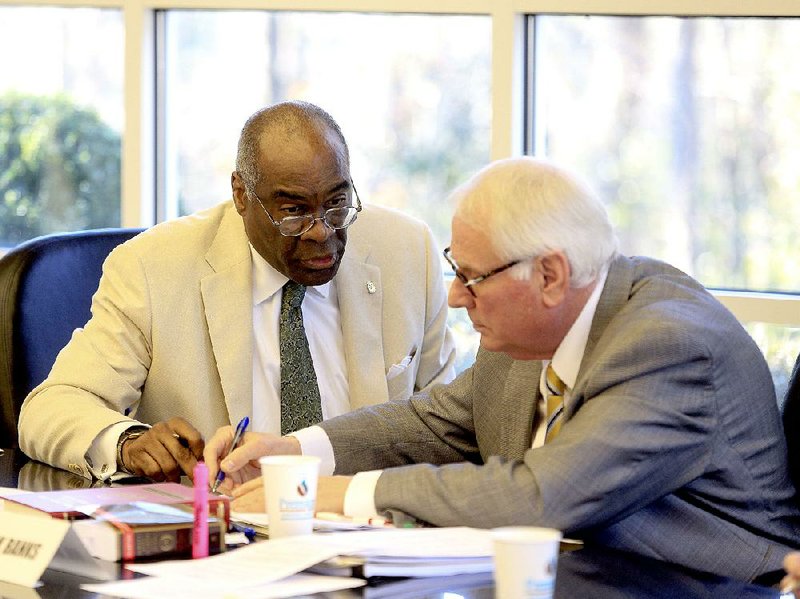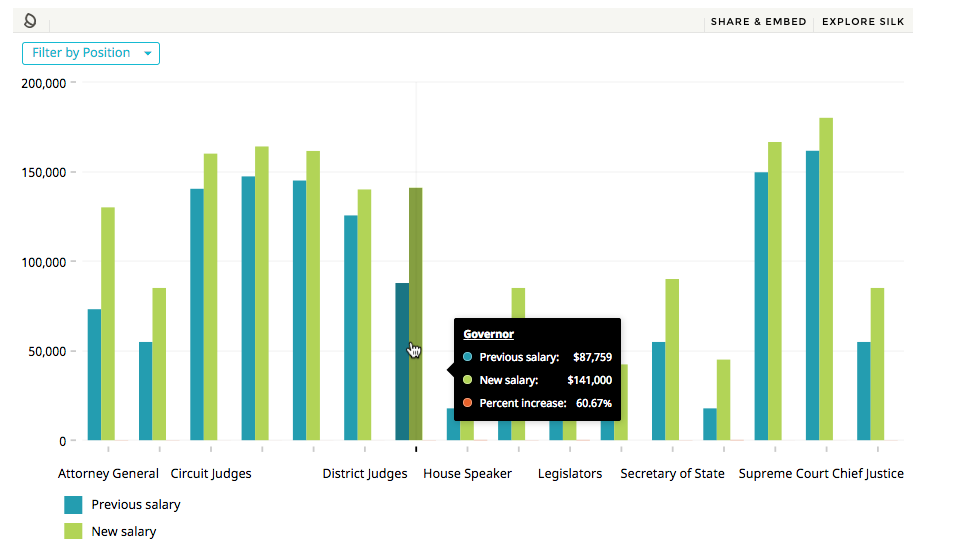Correction: A photograph of the Independent Citizens Commission showed Barbara Graves, Chairman Larry Ross and Stuart Hill. The photo caption misidentified Hill.
It's official: Big pay raises are coming for lawmakers and judges alike.
On Monday, the seven-member Independent Citizens Commission, which was created with voter approval of Amendment 94 in November, finalized its approval for large salary increases for elected state officials, including a 148 percent pay bump for legislators.
By a vote of 5-2, the commission ratified its Feb. 2 recommendations to raise salaries across the board, with the exception of the part-time lieutenant governor position, which it kept frozen at $42,315.
The governor's salary will climb by $53,241 to $141,000, and the attorney general's salary will increase by $56,868 to $130,000.
Legislators will see a rise from $15,869 to $39,500.
Pay for the speaker of the House and Senate president pro tempore will climb to $45,000.
The pay-raise resolutions will be delivered Thursday to state Auditor Andrea Lea, and most will take effect 10 days after she certifies them.
They will not be retroactive.
But legislators will not receive raises until they give up one of their other sources of income.
Commissioners and legislative leaders agreed to do away with the expenses, which can amount to $14,400 a year per legislator, to justify the large increase in legislators' pay.
But the commission, under state law, isn't allowed to eliminate the expense reimbursements; only the Legislature can do that.
The pay raise for legislators will only take effect once the General Assembly passes legislation eliminating the perk. Senate Bill 1049, which would do just that, has yet to be heard in the Senate State Agencies and Governmental Affairs Committee.
"The ball is in their court," Commission Chairman Larry Ross said. "[If they don't], then this [proposal] doesn't become a valid document. If they do, it becomes a valid document."
Speaker of the House Jeremy Gillam, R-Judsonia, and Senate President Pro-Tempore Jonathan Dismang, R-Searcy, have both promised the commission they'll end the home-office expenses in exchange for a raise.
"[The commission] came at it from a very thoughtful and, I think, thorough stance," Gillam said. "We're going to trust the process. So their recommendation will be one that we will follow in the House and Senate."
Ross said that if the Legislature failed to change its home-office reimbursements, and the document did become invalid, then the commission would be unable to raise lawmakers' salaries by more than 15 percent in the future.
After months of discussion, including a public comment meeting earlier this month where only two people spoke out against the pay increases, the raises Monday almost didn't go through.
A debate broke out at the start of the meeting about whether the commission would be able to alter any of the salary recommendations now that the public had weighed in.
Ross said that he thought the commission should be able to adjust some of the salaries. Vice Chairman Chuck Banks -- a lawyer -- said that under the language of Amendment 94, they could only vote "up or down" on the complete list of salaries they initially recommended in February.
There were moments in the debate when things got testy.
"I'm--" Banks said.
"You're not recognized," Ross said.
"I'm not gonna waste anymore time--"
"Not until you're recognized,"
"I'm going to speak. You can either address me or not," Banks said.
The attorneys on the commission, as well as a representative from the state attorney general's office, said that it appeared that Banks' reading of the law was right and that the committee would have to approve all the salaries or reject them all.
Ross, who said he abstained from several votes during the process, thinking that they would be able to return to them after the public comment, said he was disappointed.
"I thought we needed to, after hearing the public [input on salaries], we needed to go back and at least, line by line, say 'OK, let's talk about it,'" Ross said. "But the law is what it is, and we'll adhere to the law," he said.
Stuart Hill, who -- like Ross -- ended up voting against the package, said that if that was the case, it was bad law.
"What's the purpose of public comment then if there's not the opportunity to bring that into discussion and see if that does change your mind?" Hill said. "If it changes your mind and you're only voting up or down on the whole thing then that limits you."
Another commissioner, Barbara Graves, agreed with Ross and Hill, saying she thought it was important to be able to come back to the proposed salaries after the public comment period. She ultimately voted for the package.
"It's a total misconception, and three of us had that, that we would take public comments and there would be an opportunity to change part of [the proposals] and there wasn't any opportunity to do that," Graves said. "Three of us are asking that question: What was gained [by public comment]?"
Although most Arkansans who spoke or sent e-mails opposed the salary increases, pay raise supporters on the board said none of the public comment offered information the committee hadn't already considered.
"You're not ignoring public comment. None of us are," Banks said. "The truth of the matter is... the vast majority of the public that is not commenting... is reasonably satisfied with this."
The other salary increases are:
• Secretary of state: from $54,848 to $90,000.
• Treasurer: $54,848 to $85,000.
• Auditor: $54,848 to $85,000.
• Land commissioner: $54,848 to $85,000.
• Chief justice: $161,601 to $180,000.
• Supreme Court justice: $149,589 to $166,500.
• Appeals court chief judge: $147,286 to $164,000.
• Court of Appeals judge: $144,982 to $161,500.
• Circuit judge: $140,372 to $160,000.
• State district judge: $125,495 to $140,000.
The citizen commission's work isn't over yet.
A bill that shifts the authority for setting the salaries for prosecutors from the Legislature to the commission cleared the House on Monday in an 85 to 2 vote. SB177 by Sen. Jon Woods, R-Springdale, passed in the Senate earlier this month and will head to the governor's desk for approval.
Woods, who helped draft Amendment 94, said he wrote SB177 after accidentally leaving prosecutors off the list of state elected officials whose salaries are determined by the independent commission.
Metro on 03/17/2015
Reader poll
Do you agree with the salary panel's decision on raising elected officials' pay?
- Yes, they all deserve raises.
- No, they deserve smaller raises.
- No, they don't deserve raises at all.
- I agree with other elected officials' raises but not legislators'.
- I agree with raising legislators' pay but not others'.
- Other (please comment)
305 total votes.


